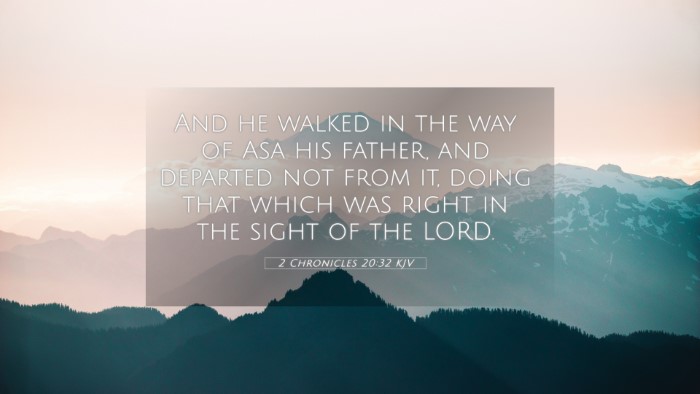Understanding 2 Chronicles 20:32
2 Chronicles 20:32 states: "And he walked in the way of Asa his father, and departed not from it, doing that which was right in the sight of the Lord."
This verse emphasizes the faithfulness of Jehoshaphat, King of Judah, in following the righteous path set by his father, Asa. Jehoshaphat's commitment to God is crucial in understanding the historical and spiritual context of his reign.
Verse Meaning & Interpretation
The combined insights from public domain commentaries shed light on the implications of this verse:
-
Matthew Henry: Henry highlights the importance of a godly lineage, focusing on how Jehoshaphat's adherence to his father's ways signifies a positive legacy. It underscores the need for successors to uphold righteous paths, emphasizing that one's relationship with God influences leadership and the well-being of the nation.
-
Albert Barnes: Barnes points out the significance of doing what is right in the eyes of the Lord, stressing that true leadership is demonstrated through compliance with divine standards. This verse indicates that Jehoshaphat's reign was marked by stability and divine favor due to his righteousness.
-
Adam Clarke: Clarke adds depth by noting that Jehoshaphat’s determination not to stray from Asa’s ways reflects a commitment to the covenant with God. His actions are part of a larger narrative of religious reformation and the quest for ethical governance among God’s chosen people.
Thematic Connections
The verse serves as a poignant reminder of the consistent biblical theme of fidelity to Godly principles. Several cross-referenced verses illuminate this theme:
- 1 Kings 15:11: "And Asa did that which was right in the eyes of the Lord, as did David his father." - This verse parallels Jehoshaphat's actions to those of Asa, establishing a continuum of righteousness.
- 2 Chronicles 17:3-4: "And the Lord was with Jehoshaphat, because he walked in the first ways of his father David, and sought not unto Baalim." - This reinforces Jehoshaphat's commitment to the Lord, directly linking him to his ancestors' practices.
- 2 Chronicles 19:4: "And Jehoshaphat dwelt at Jerusalem: and he went out again through the people from Beersheba to Mount Ephraim, and brought them back unto the Lord God of their fathers." - This shows Jehoshaphat’s proactive steps in leading his people back to God.
- 1 Peter 1:17: "And if ye call on the Father, who without respect of persons judgeth according to every man's work, pass the time of your sojourning here in fear." - The importance of righteous conduct resonates throughout scripture, linking to Jehoshaphat’s obedience.
- Deuteronomy 4:29: "But if from thence thou shalt seek the Lord thy God, thou shalt find him, if thou seek him with all thy heart and with all thy soul." - This reflects the underlying principle of seeking God wholeheartedly, a trait evident in the life of Jehoshaphat.
- Proverbs 3:5-6: "Trust in the Lord with all thine heart; and lean not unto thine own understanding. In all thy ways acknowledge him, and he shall direct thy paths." - Jehoshaphat’s reliance on God’s direction aligns with this wisdom literature.
- Luke 6:46: "And why call ye me, Lord, Lord, and do not the things which I say?" - A pertinent verse reminding leaders and individuals alike about the importance of obeying God's directives.
Application for Today
The call for believers today is to emulate Jehoshaphat’s integrity and steadfastness. Just as he prioritized righteousness, individuals are encouraged to seek God’s guidance and make decisions that reflect God’s will. Applying lessons from Jehoshaphat’s life can lead to personal growth and a more profound relationship with God.
Conclusion
2 Chronicles 20:32 serves not only as a historical account but also as a source of inspiration for modern believers seeking to align their lives with divine principles. Reflecting on cross-referenced passages reinforces the understanding of a faithful life led by obedience to God.
Further Study and Resources
For those interested in developing a deeper understanding of biblical texts and themes, utilizing tools for Bible cross-referencing can be invaluable. Scripture can be interconnected through:
- Online Bible concordances
- Bible cross-reference guides
- Cross-reference Bible study methods for comprehensive learning
Engaging in cross-referencing Bible study not only enhances comprehension but also enriches one’s spiritual journey as connections between various parts of the Bible surface, creating an inter-Biblical dialogue that illuminates God's overarching narrative throughout scripture.









